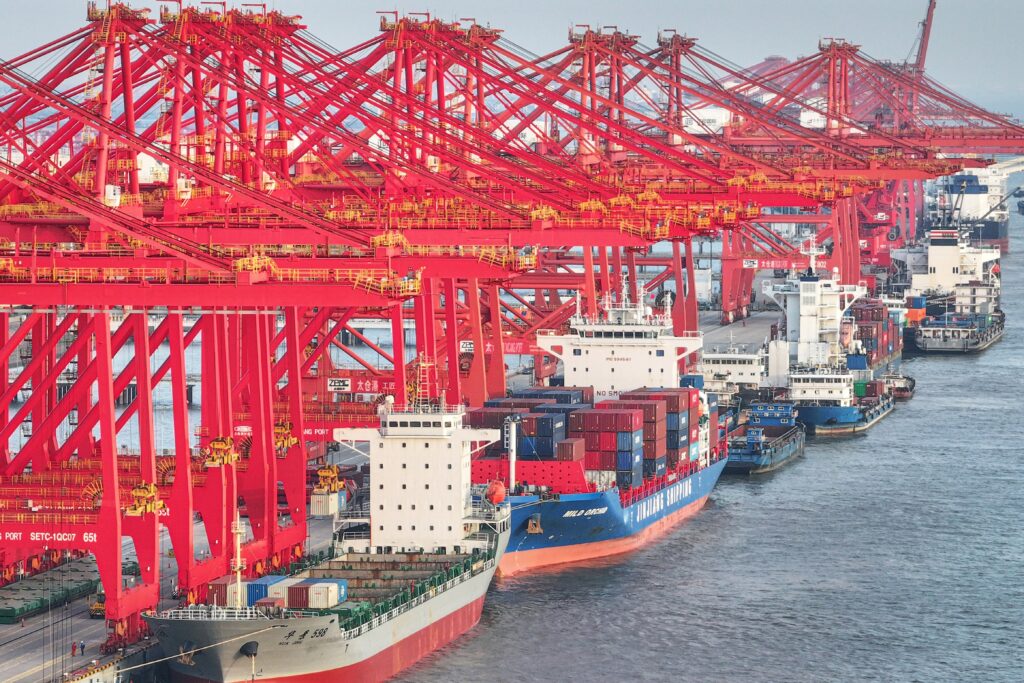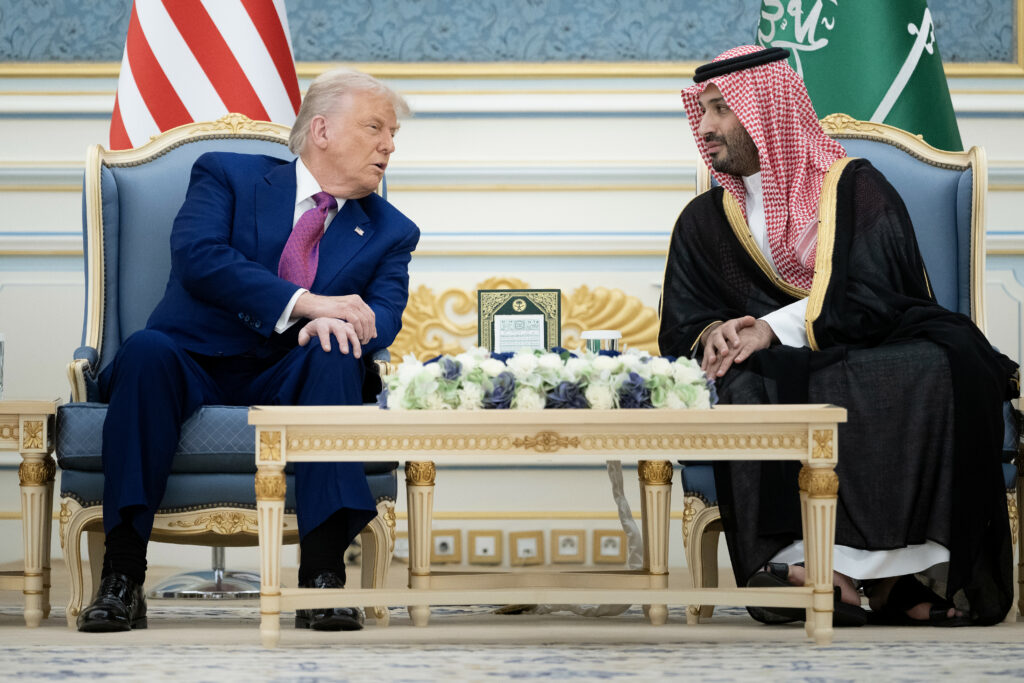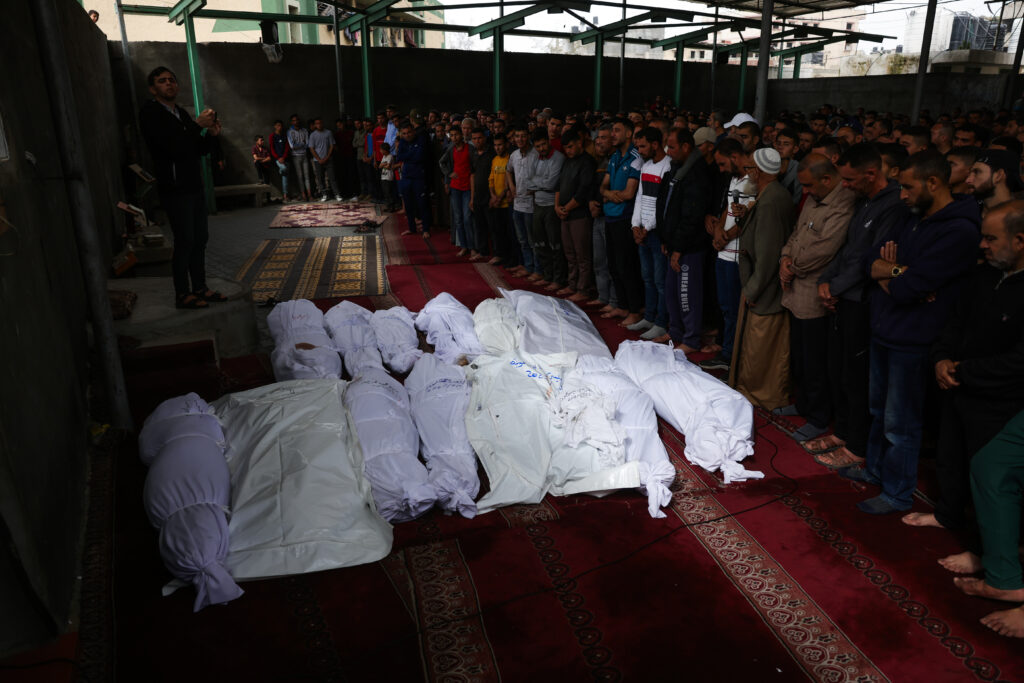AFP Asia Business
China, US slash sweeping tariffs in trade war climbdown
The United States and China slashed sweeping tariffs on each others’ goods for 90 days on Wednesday, after a temporary ceasefire in a brutal trade war that roiled global markets and international supply chains.Washington and Beijing agreed to drastically lower skyhigh tariffs in a deal that emerged from pivotal talks at the weekend in Geneva.US …
China, US slash sweeping tariffs in trade war climbdown Read More »
Human Rights Watch warns of migrant worker deaths in 2034 World Cup host Saudi Arabia
Human Rights Watch on Wednesday said abuses were being committed on giant construction sites in Saudi Arabia and warned of the risks to migrant workers building stadiums for the 2034 World Cup.HRW said “scores of migrant workers in Saudi Arabia die in gruesome yet avoidable workplace-related accidents, including falling from buildings, electrocution, and even decapitation”.The NGO, which has studied nearly 50 cases of deaths in Saudi Arabia, said Saudi authorities had “failed to adequately protect workers from preventable deaths, investigate workplace safety incidents, and ensure timely and adequate compensation for families” including through life insurance policies and benefits to survivors.”The risks of occupational deaths and injuries are further increasing as the Saudi government ramps up construction work for the 2034 World Cup as well as other ‘giga-projects’,” HRW added.The Gulf kingdom was handed the right to host the 2034 World Cup at a FIFA Congress last December despite concerns about its human rights record, the risks to migrant labourers and criminalisation of same-sex relationships. It was the only candidate.The NGO called on FIFA to ensure all work-related deaths in Saudi Arabia are properly investigated and that bereaved families receive compensation.- ‘Long and burdensome’ -According to HRW, FIFA said it plans to establish a workers’ welfare system “dedicated to mandatory standards and enforcement mechanisms for World Cup-related construction and service delivery in Saudi Arabia”. But football’s world governing body did not provide “details on concrete measures to prevent, investigate, and compensate migrant worker deaths such as risk-based heat protection measures or life insurance”.HRW claimed “FIFA is knowingly risking yet another tournament that will unnecessarily come at a grave human cost”, referencing the decision to award the 2022 World Cup to Qatar.Similar concerns over workers’ welfare dogged Qatar ahead of its hosting of the tournament.Amnesty International and other rights groups claimed thousands of migrant workers died in the lead-up to the 2022 tournament, though Doha has said only 37 workers on World Cup projects perished — and only three in work-related accidents.HRW stated in its report that the majority of migrant worker deaths in Saudi Arabia are attributed to “natural causes” and are therefore neither investigated nor compensated.According to figures provided by the NGO, for example, 74 percent of 1,420 Indian migrant worker deaths recorded at the Indian embassy in Riyadh in 2023 were attributed to natural causes.HRW added “even work-related death cases categorised as such in a migrant worker’s death certificate are sometimes not compensated as they should be according to Saudi law and international labour standards”.”In migrant death cases that are compensated, the process is long and burdensome,” the report said, providing an example of one such compensation process that took a decade to be completed.”My sons are 11 and 13 years old. When my husband died, they were 11 months and two years old. If we had received compensation right after his death, it would have provided so much relief,” the wife of a deceased worker, who was not named, told HRW.AFP has contacted FIFA and the Saudi government for comment.
Trump set to meet Syrian leader ahead of Qatar visit
Donald Trump was set to meet the leader of Syria and the heads of the Gulf states Wednesday in Riyadh before travelling to Qatar where controversy is swirling over the gifting of a luxury aircraft.The US president was set to “say hello” to Syria’s new leader Ahmed al-Sharaa during his last day in Riyadh, after vowing to remove sanctions against the war-ravaged country.”I will be ordering the cessation of sanctions against Syria in order to give them a chance at greatness,” Trump said during a speech at an investment forum in the Saudi capital. “What I do for the crown prince,” he added, before being joined on stage by Saudi Arabia’s de facto leader Mohammed bin Salman, who along with Turkey has backed the Sunni Islamists who toppled Bashar al-Assad in December.The move comes despite misgivings about the direction of Syria from US ally Israel, which has unleashed military strikes on its neighbour both before and after the fall of Assad, an Iranian ally.Trump will also meet with leaders and representatives from the six Gulf Cooperation Council states: Saudi Arabia, the United Arab Emirates, Bahrain, Qatar, Kuwait and Oman.The diplomatic sitdowns followed a day dedicated to sealing billions of dollars in commercial agreements, with the United States and Saudi Arabia signing a raft of deals involving energy, AI, weapons and tech. The White House said that Riyadh would purchase nearly $142 billion in arms in what it described as the largest-ever weapons deal.Washington said that Saudi company DataVolt was set to pour $20 billion in artificial intelligence-related projects in the United States. Tech companies including Google will also invest in both countries — likely welcome news for Saudi Arabia which has long faced restrictions securing advanced American technology.- Qatar controversy -Trump was set to head to Doha around midday. The tiny Gulf country that is home to a sprawling US air base has also served as a mediator between Israel and Hamas on ending the devastating war in Gaza. But the stop has largely been muddled by controversy following news that Trump planned on accepting a $400 million luxury plane as a gift from Qatar.The Boeing airplane would serve as a new, more modern presidential jet and then be put to Trump’s personal use once he leaves the White House.The move raises huge constitutional and ethical questions — as well as security concerns about using an aircraft donated by a foreign power as the ultra-sensitive Air Force One.Chuck Schumer, the top Democrat in the Senate, on Tuesday vowed to hold up all Justice Department political appointees in protest over the move. The visit to Qatar comes just days after Washington negotiated directly with Hamas to secure the release of a hostage with US citizenship, Edan Alexander. Qatar, alongside Egypt and the United States, hammered out a ceasefire between Israel and Hamas in Gaza that came into effect on January 19 — a day before Trump’s inauguration — but failed to end the war.The initial phase of the truce ended in early March, with the two sides unable to chart a path forward. Israel resumed air and ground attacks across the Gaza Strip, blocked aid and pledged to conquer the territory.On Tuesday, Israeli Prime Minister Benjamin Netanyahu said the military would enter Gaza “with full force” in the coming days, saying: “There will be no situation where we stop the war.”Trump was set to finish his tour of the Gulf with a final stop in Abu Dhabi later in the week.
UN relief chief urges action ‘to prevent genocide’ in Gaza
United Nations relief chief Tom Fletcher on Tuesday called on the UN Security Council to take action “to prevent genocide” in Gaza, delivering a scathing account of Israel’s actions in the Palestinian territory.Fletcher, the UN Under-Secretary-General for Humanitarian Affairs, demanded that Israel lift its aid blockade on Gaza, where its offensive has killed tens of thousands and reduced much of the enclave to rubble.”For those killed and those whose voices are silenced: what more evidence do you need now?” asked Fletcher. “Will you act — decisively — to prevent genocide and to ensure respect for international humanitarian law?”He alleged that Israel was “deliberately and unashamedly imposing inhumane conditions on civilians in the Occupied Palestinian Territory.”Fletcher said UN agencies had “life-saving supplies” ready to deliver at the borders but were denied access by Israel. He also decried Israel’s conditions for allowing aid delivery as “a cynical sideshow.””It makes starvation a bargaining chip,” Fletcher said. “A deliberate distraction. A fig leaf for further violence and displacement. If any of this still matters, have no part in it.”The Israeli proposal for aid deliveries, the details of which have not been made public, “practically excludes many, including people with disabilities, women, children, the elderly and the wounded,” he said.In a joint statement, five European members of the UN Security Council said that they were “deeply concerned” at the Israeli plan, “which the UN has said would not meet humanitarian principles.””Humanitarian aid must never be used as a political tool or a military tactic,” read the statement by France, Britain, Slovenia, Greece and Denmark.Israel’s ambassador to the UN, Danny Danon, rejected the allegations against his government as “baseless and outrageous accusations.”- ‘Children scream’ -The UN relief chief warned that while the International Court of Justice deliberated over whether Israel’s actions in Gaza constituted genocide, “it will be too late.””We have briefed this Council in great detail on the extensive civilian harm we witness daily: death, injury, destruction, hunger, disease, torture, other cruel, inhuman or degrading treatment, repeated displacement, on a large scale.”We have described the deliberate obstruction of aid operations and the systematic dismantling of Palestinian life, and that which sustains it, in Gaza,” he said.On Tuesday, Israeli strikes on Gaza continued, with rescue officials saying an attack near a hospital in the south of the territory killed at least 28 people.Israeli Prime Minister Benjamin Netanyahu has announced his military would enter Gaza “with full force” in the coming days, after recommencing operations having broken a ceasefire two months ago. The war began in October 2023 after a Hamas attack on Israel resulted in the deaths of 1,218 people, mostly civilians, according to an AFP tally based on official data.Israel launched a withering offensive in response, killing at least 52,908 people — mostly civilians — according to data from the Hamas-run health ministry, which is considered reliable by the UN.It has also targeted civilian infrastructure, destroying roads, schools, hospitals and residential neighborhoods, alleging that Hamas was using them as cover.”I can tell you from having visited what’s left of Gaza’s medical system that death on this scale has a sound and a smell that does not leave you,” said Fletcher. “As one nurse described it: ‘children scream as we peel burnt fabric from their skin.'”The senior official charged that the UN Security Council was not doing enough to prevent the violence.”For those who will not survive what we fear is coming — in plain sight — it will be no consolation to know that future generations will hold us in this chamber to account,” he said.”But they will. And, if we have not seriously done ‘all we could,’ we should fear that judgment.”




